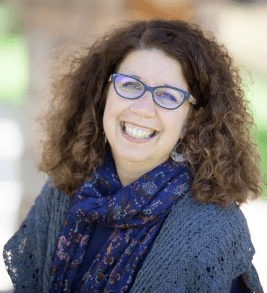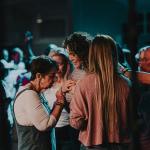 How I’m Learning To Love God With My Mind, By Michelle Van Loon patheos.com/blogs/pilgrimsroadtrip michellevanloon.com
How I’m Learning To Love God With My Mind, By Michelle Van Loon patheos.com/blogs/pilgrimsroadtrip michellevanloon.com
My Jewish parents used to tell me that the one thing “they” couldn’t take from me was an education. As I grew older, I learned that the “they” to whom my mom and dad referred were the various Gentile groups who’d persecuted the Jewish people for millennia. Though they were in no way academics, my hard-working parents did teach me that there was immeasurable value, if not virtue, in the act of learning.
I was a bookish kid, and after I came to faith in Jesus in my mid-teens, I brought my hunger for learning to my newfound faith. I devoured pop Christian titles and theology books alike. As I moved into adulthood, I discovered there wasn’t a ready spot for women who liked to read theology and ask questions in the conservative non-denominational and Charismatic congregations my husband and I attended. The other women at church seemed content with teas and pre-packaged Bible studies. If I wanted to have friends, I thought I needed to stifle my mind a bit so I could find friends.
I went to teas, filled in the blanks of the Bible study guides, made casseroles, and ran VBS programs. I was not entirely successful at hiding my intellectual curiosity under the proverbial bushel basket, as I would receive backhanded non-compliments from some of my leaders in these churches, telling me I was “quirky”, “too smart”, and “too opinionated”.
My bright husband found teaching and leadership in these congregations gave him a measure of what his intellect longed for, but found groups tasked on running churches tended to focus on uniformity of thought, doctrine, and lifestyle rather than cultivating spiritual growth that included learning to love God with his mind. As a result, my husband eventually made his way to seminary where he found in some of his classes safe spaces to explore his questions and nourish his soul. What he was learning, I was learning, as his books and lectures became a part of my own learning as we talked about his classes, I proofed his papers, and read his books.
For too long, I labored under the mistaken notion that loving God with my mind was either making sure I had a non-stop soundtrack of Bible verses running through my head or being diligent to take notes during the sermon. The churches we attended emphasized other parts of Jesus’ command to love God heart, soul, mind, and strength, encouraging us to love God with our emotions, our evangelism to those outside the church, and our service to the local body of believers. We heard too often in these congregations that “too much head knowledge” was a threat to our souls.
I’ve discovered there are many versions of the “they” against whom my parents once cautioned me, including who stifle the joy of loving God with our minds. Certainly, the pursuit of knowledge can fuel pride and self-sufficiency. But it can also make mature worshippers out of us, and might be one of the gifts we give in humility and gratitude to the Church.
For the most part, it hasn’t been a local congregation that’s helped me learn to love God with my mind, and exercise that love in service to others. It’s come from the broader Christian community:
- Online: Blogs (like this one!), websites, and a couple of Facebook groups have been places where I could listen to many viewpoints, and learn to use my own voice.
- A Bible study comprised of women from a variety of churches: The diversity of Christian faith traditions in the group keeps our study, prayer, and service majoring on the essentials of the faith, and the intelligence and devotion of the study’s leader pushes our group to dig deep.
- A discussion group: Twice a month, a small group of us gather to discuss articles and questions we’ve sent to one another in advance of our meeting. We’ve discussed everything from immigration policy to ageism to family traditions. We don’t always agree with one another, but we honor one another’s point of view.
- Seminary classes: I’ve had the privilege of studying at Northern Seminary. The classroom experience has enriched me more than I can express. It has celebrated what I’ve learned through my own Yentl-like study over the years, challenged some of my cherished pre-existing assumptions, and led me into worship in ways I never could have imagined.
- Books: The written word formed me as a believer four decades ago, and it is still one of the primary ways in which I’m formed and re-formed as a follower of Jesus.
What say you? What communities or practices have helped you learn to love God with you mind?















